Why I'm voting for Trump
CNN talks to more than 150 people in 31 cities to explore what's driving the Trump phenomenon
Updated 2:25 PM ET, Thu January 28, 2016
(CNN)They are showing up in droves to see Donald Trump: Men and women, overwhelmingly white, frustrated with the country's first black president, fearful that they are being displaced by minorities and immigrants, and nostalgic for the way America used to be.
And Trump is thriving, tapping into the fears and anxieties that have erupted into the open in an extraordinary presidential campaign.
The voters pledging their allegiance to the Republican front-runner hail from all corners of the country. They work on farms, in nursing homes and run small businesses; they've voted for Mitt Romney and Barack Obama and participated in the tea party movement; they are high school students who will vote for the first time this November and retirees and veterans who came of age during World War II.
In Trump, these people see the next president of the United States.
His attitude, one voter said, is that he "seems to just not give a f---." Trump's nativist rhetoric and hardline immigration stance is a relief for those who see a segment of the population "getting away" with breaking the law. Post-San Bernardino, the candidate's promise to "bomb the sh-- out of ISIS" exudes an uncomplicated confidence rare in other politicians. His accomplishments in the business world offer reassurance that he'll "put the economy back where it belongs."
Perhaps most important is Trump's imperviousness to the typical boundaries around race. He has made provocative remarks on the subject since the earliest days of his campaign -- and his supporters are listening. They are rowdy, and at times, even violent. On more than one occasion, they've accosted protesters, lobbing racial slurs and physical abuse.
The following story attempts to capture the remarkable Trump phenomenon -- and the anti-establishment anger, and the racial and economic fears beneath it -- through the people who have flocked to Trump rallies since last summer. The voices were chosen from more than 150 people -- including supporters and opponents of Trump -- that CNN reporters interviewed in 31 cities across the country over the past few months and asked about some of the candidate's more controversial statements.
These interviews provide a snapshot of a political movement unprecedented in modern politics. They reflect some of the loudest and most passionate defenders of Trump, a candidate who has said he has such deep loyalty among his supporters that he could "stand in the middle of 5th Avenue and shoot somebody and I wouldn't lose voters." Many people CNN interviewed were not turned off by Trump's provocative remarks — but inclined to agree with his statements and his unvarnished approach to self-expression. There is no getting around the impression that for some, racial attitudes are fueling their support.
But there are also other factors feeding the enthusiasm: the belief that Americans are unsafe, and he will protect them; an appreciation for the simple good vs. evil worldview he presents; an admiration of his celebrity status and business background. And, above all, a faith that he will restore an America they feel has been lost to them, and dream of experiencing again.
Why can't they follow the rules?
There's widespread anger that too many immigrants are simply "getting away" with not playing by the rules at the expense of hard-working white Americans. Why do some people not pay taxes? Not have jobs? Come into the country illegally?
On October 21, a line had begun to form outside the Burlington Memorial Auditorium in southeast Iowa by mid-afternoon. Trump, at the time topping national and Iowa polls, was scheduled to speak at 6 p.m.
One of the people waiting in line -- a woman in her 30s named Norma Sweet -- stood out. She appeared to be the only non-white person waiting for Trump.
Sweet was there with her husband, Terry Sweet, who is more than 30 years her senior. They said Norma came to the country 13 years ago from the Philippines and that she has been a citizen for 8 years. Speaking with a CNN reporter, Terry proudly pointed to his wife as an example of immigration done "correctly."
"It's not fair to her to let the illegals stay here. She does everything right. She works, she pays taxes, she votes," he said.
The couple said they both planned to vote for Trump.
This sentiment -- that too many immigrants are bending the rules and even have a leg up on American-born citizens -- is widespread among Trump supporters, despite laws that bar illegal immigrants from receiving benefits such as welfare, food stamps and Medicaid. These individuals have drawn comfort from Trump's hardline immigration stance and his vow to create a system in which "no one is above the law."
A November CNN/Kaiser Family Foundation survey captured the white frustration around race that Trump is tapping into. A majority of whites have a fundamentally different view of whether the federal government should ensure income equality between whites and minorities: 57% of whites said this was not the government's burden, but a majority of African-Americans (67%) and Hispanics (63%) said it was.
Paul Weber of Appleton, Iowa, describing himself as "kind of a redneck" at an October Trump rally in Waterloo, said he was tired of the so-called "new Americans" flooding the country.
"The people that are coming in here from China, Indonesia and all of them countries, they're getting pregnant and coming here and having babies," Weber said, telling an Asian reporter that he meant no offense. "They get everything and the people that were born here can't get everything."
A woman named Deena from Myrtle Beach, South Carolina, attending a Trump rally there in late November made the following analogy about illegal immigration.
"I come home and someone's occupying my house and they're eating my food and then they're taking the kids from my bed; they're taking the money out of my pocket," said Deena, who said she was still undecided on Trump. "Why should we have to support someone else and then make our kids suffer, our families suffer?"
But some of these same individuals are also quick to emphasize that their deep concerns about illegal immigration don't necessarily make them anti-immigrant.
Sherry Schnell, a "big fan" of Trump even before he decided to run for president, said she was in favor of both a wall along the Mexico border and more immigrants.
"If we have them all come in, they've all been inspected and they've all gone through the rules and regulations to become a citizen, I want more," Schnell said at a Trump rally in Sarasota. "The more the merrier."
A divisive President
There is a very palpable anger at President Obama. Many Trump supporters say he can't be trusted, he cares more about the welfare of black people than whites and he's inflamed racial divisions in the country. Others say they're convinced that he's Muslim.
Long before the wall along the Mexico border and a Muslim "ban," Trump was fixated on another controversial issue: Obama's birthplace.
For years, the real-estate developer has publicly questioned whether Obama was in fact born in Hawaii, and in turn, his eligibility to be president. Though he has shown little interest in reviving that theory as a presidential candidate, Trump is now aiming that skepticism at one of his rivals, Ted Cruz, alleging that because the Texas senator was born in Canada, he may not be eligible to run for president.
For many Trump fans, the candidate's once prominent role in the so-called Obama "birther" movement has left a lasting impression.
The skeptics, dispersed throughout Trump rallies, have serious misgivings about the President's U.S. citizenship and Christian faith more than four years after Obama publicly released his birth certificate.
"Islam is traced patrilineally. I am a Muslim if my father is Muslim. In that sense, it is undeniable that Barack Obama was born a Muslim," Michael Rooney said at a Trump event in Worcester, Massachusetts, in November. (Obama is a Christian. He has said his father was born a Muslim and later became an atheist.)
Rooney, a respiratory therapist in his late 40s, likened Obama's Christian faith to Caitlyn Jenner's recent gender transition: "It is true that he now identifies as a Christian in the same sense that Bruce Jenner identifies as a woman."
At another rally in Manassas, Virginia, on December 2, Robin Reif, 54, yelled into the crowd that the President was from Kenya. He told CNN afterward that Obama was "too much of a Muslim" and an "Islamist sympathizer."
"In our Constitution, it says that the president has to be an American citizen," Reif said. "I'm still wondering where is he really from. What is this man's background?"
The widespread distrust of the President has to do with much more than just his birthplace or religion.
If the President's supporters view his 2008 election as an historic moment that helped break down a racial barrier, others blame the country's first African-American President for deepening racial tensions.
Said George Ziegler, a Trump supporter attending a Columbus, Ohio, rally on November 23: "Obama was supposed to bring us together. Instead, he's divided us."
The silent majority: 'No one's looking out for the white guy anymore'
Energizing the Trump movement are voters who call themselves the "silent majority." These individuals feel strongly that white people, too, face discrimination in this country, and that they are often wrongly accused of being racist. This is stirring anger at the Black Lives Movement.
Fueled by a series of deadly police shootings perpetrated by white officers against blacks, the Black Lives Matter movement has become a powerful symbol of the racial tensions that run deep in the United States.
Angry protesters spilled onto the streets of Baltimore, Ferguson and Chicago, determined to have their voices heard. More than five decades after the passage of the Civil Rights Act, and well into Obama's second term, racial discrimination against African-Americans may have become less overt but is still very much a reality, the activists pleaded.
At Trump's campaign rallies, a similar frustration is palpable -- among white voters.
Taking their cue from Trump, these individuals are calling themselves the "silent majority." Some say they suffer from "reverse discrimination."
Rhett Benhoff, a middle-aged white man at a December Trump campaign event in Raleigh, North Carolina, said discrimination against whites is "absolutely" real.
"I mean, it seems like we really go overboard to make sure all these other nationalities nowadays and colors have their fair shake of it, but no one's looking out for the white guy anymore," he said.
Among Trump supporters, suspicion and anger toward the Black Lives Matter movement run deep. These people say the group's name and slogan seem to convey that black lives are more important than white lives.
"I think it's bulls---," said Ziegler, the 61-year-old diehard Trump fan who attended his Columbus, Ohio, rally. "All lives matter. You know this is bulls---- about black lives matter -- doesn't all lives matter?"
It's the last word in Trump's now-ubiquitous campaign slogan -- "Make America Great Again" -- that seems to have touched a nerve. Recent polls show that white people increasingly feel that the American Dream is out of reach, and a sizable group of white Americans feel they are subjected to racial discrimination -- a perception of the white experience shared by few minorities.
Almost half of whites -- 47% -- said in a November CNN/Kaiser Family Foundation survey that there is discrimination against whites, far more than the share of blacks and Hispanics who said the same.
And just over half of whites said they did not support the Black Lives Matter movement. Whereas 86% of blacks said the justice system was tilted toward white people, only 48% of whites said the same.
At the Trump rally in Myrtle Beach, where signs that read "silent majority" dotted the crowd, Patricia Saunders told CNN that Trump is speaking directly to a segment of the population that feels left behind and marginalized.
"White Americans founded this country," said Saunders, 64. "We are being pushed aside because of the President's administration and the media."
A country under attack
Many Americans are deeply frightened by the recent spate of terrorist attacks around the world and wonder whether Obama is doing enough to keep the country safe. Trump's explosive proposals to increase surveillance of mosques, keep a database of Muslim-Americans and enforce a temporary "ban" on Muslims entering the country have energized his supporters.
Brothers Ernie Martin and Lee Walter from Cresco, Iowa, were among a group of zealous Trump fans at the front of the line outside a Trump rally in Des Moines on December 11. They had waited more than seven hours to see the candidate in person.
"Hey, hey. Ho, ho. All the Muslims have to go!" Walter, a 64-year-old retired factory worker, began to chant.
Just days before, Trump -- who had already said he would implement a national database to register Muslims in the United States -- had put out a startling press release: a call for a "total and complete shutdown of Muslims entering the United States."
The proposal marked one of the most striking examples of Trump's penchant for forceful national security rhetoric and came on the heels of two deadly events that shifted the course of the 2016 race: the terrorist attacks in Paris that killed 130 people in November, followed by a shooting in San Bernardino, California, a few weeks later that left 14 people dead.
It drew swift and widespread condemnation, including from some of Trump's fellow GOP rivals and the Muslim-American community.
But at Trump rallies, the proposal resonated in a different way.
Just hours after Trump made the controversial announcement, his supporters -- waiting to hear him speak in Mount Pleasant, South Carolina, said they were fully on board.
"I don't want them here," Ed Campbell said. "Who knows what they're going to bring into this country?"
The mass shooting in San Bernardino marked a turning point -- the first real evidence that ISIS could also kill on American soil. Trump seized on deep-seated fears about the country coming under siege, labeling himself the "most military person there is" and vowing to "bomb the sh—out of ISIS."
Bickie Mason, a contractor from Lyman, South Carolina, who attended Trump's Spartanburg rally in November, said he felt he didn't have a choice but to agree with Trump's idea of tracking Muslim-Americans through a national database.
"I don't believe all Muslims are bad. But anybody can turn bad, and you've got to be able to locate them and know where they're at," said Mason, 64.
Trump's Muslim ban has unleashed more visceral reactions, including unambiguously hostile views toward Islam.
His supporters across the country -- from Iowa to New Hampshire to South Carolina -- told CNN in interviews they simply believe Islam is not a peaceful religion.
"Islam is not a religion. It's a violent blood cult. OK?" said Hoyt Wood, a 68-year-old military veteran waiting to hear Trump speak aboard the U.S.S. Yorktown in Mount Pleasant, South Carolina. "All they know is violence, that's all they know."
At the same rally, 55-year-old Susan Kemmelin said, "We can't look at a Muslim and tell if they're a terrorist or friendly."
Robert Engelkes, a 45-year-old corn and soybean farmer from Dike, Iowa, pointed out that there is historical precedent for targeting one group.
"What did we do in World War II? We put all the Japanese in internment camps," said Engelkes, who was standing outside a Trump event in Des Moines. "We had to do something with them."
Donald Trump: A candidate like we've never seen before
Trump has mesmerized voters. People say they have never seen a presidential candidate like Trump: He's unfiltered; he's anti-establishment; he exudes confidence and strength; he's not a politician.
If anything has been more surprising than Trump's endurance this election cycle, it's the seemingly fierce loyalty of his supporters.
It began in June with just a few hundred people crammed into the shiny lobby of Trump Tower in midtown Manhattan, there to witness Trump finally confirm the rumors -- he was indeed running for president.
When he hit the campaign trail, the crowds quickly swelled.
Thousands were soon turning up at school gymnasiums, auditoriums and local event halls to see Trump in person, forming long, winding lines that often spilled into overflow rooms. In the first weeks and months of Trump's campaign, plenty of attendees admitted they were there to catch a glimpse of the former host of the "The Apprentice" -- maybe even shake hands with the TV star.
But as the 69-year-old New Yorker rose to the top of the GOP pack, voters -- along with many in the media who had assumed the Trump campaign would be short-lived --started to reassess the unlikely presidential candidate.
Trump's colorful off-the-cuff speeches and forceful message on immigration and national security were reverberating. The curious, star-struck observers increasingly gave way to fans eager to pledge their support to the political newcomer.
Nicomi Kloempken, a Trump supporter at a Raleigh, North Carolina, campaign event in early December, put it bluntly: "He seems to just not give a f---, you know what I mean?"
That attitude would propel Trump from one controversy to the next, starting on Day One.
Rather than turn supporters off, each inflammatory statement only seemed to reinforce Trump's novelty and appeal.
Curt Handschug, an independent voter from Columbus, Ohio, who voted for Barack Obama in 2012, said he believes 2016 is the year of "Donald Trump or nobody." Trump's willingness to speak the truth, he said, set him apart from politicians.
"Sometimes he'll say things, and I'll go, 'Oh gosh, seriously?' But at least he's willing to say it," Handschug said at a Trump rally in November. "All these politicians are afraid to tell the truth."
And next to a GOP field crowded with governors, senators and ex-politicians, Trump's successful business career is a refreshing contrast.
"I like him because he's a businessman. He does what he says he's going to do. I've seen him lose a ton of money and bounce back," said Trump supporter Linda Wilkerson at a Raleigh campaign event. "We're in terrible financial debt. I hope he can bail us out."
Trump took the lead as the candidate most trusted to handle the economy last summer, and continues to dominate the field on the issue. According to the latest CNN/ORC polling, 57% of Republican voters nationally say they trust Trump over the rest of the field on the economy. In Iowa, he holds nearly a 40-point lead over Cruz as more trusted to handle the economy, 54% to 16%, and in New Hampshire, a CNN/WMUR poll finds 48% say they trust Trump most, while no other candidate tops 7%.
If Trump goes all the way to the general election, he would be the first businessman who has never held public office to win the GOP nomination since Wendell Willkie in 1940.
"With his background, he's going to put the economy back where it belongs," said Jamie Peckham, another Trump fan at the same Raleigh event.
Trump is also attracting a small but enthusiastic contingent of teenagers.
Turner Eakins and two of his friends from Millard North High School, drove from Omaha, Nebraska, to a Trump rally in Council Bluffs, Iowa, at the end of December. Marveling at the candidate's authenticity and disregard for political correctness, the three teens told CNN they all plan to cast their first votes for Trump this year.
"Politics is supposed to be boring," said Eakins, who will turn 18 by primary day. "So when three 18-year-old kids are driving out 30 minutes to go to a Trump rally, I mean -- that's a movement."
The protesters
Who are they? Why are they so upset with Trump? How does Trump's rhetoric about minorities in the U.S. make them feel? And why have recent protests become increasingly ugly and even violent?
Trump was in the middle of boasting about his latest poll numbers. "We're winning all over the country," he boomed at a November campaign rally in Birmingham, Alabama.
Then he noticed the commotion on the floor of the packed convention hall -- another protester was trying to interrupt his speech. "Get 'em the hell out of here," Trump said, waving his hand dismissively.
This outburst would turn out to be a little different from other protests at Trump rallies because a CNN reporter was filming the crowd's violent reaction to the protester. The grainy cell phone footage showed angry Trump fans pushing, kicking and jeering at the man, who at one point was lying on the ground.
The 31-year-old Black Lives Matter activist, Mercutio Southall, told CNN afterwards that the people around him had called him "monkey" and the N-word.
"I got punched in the face, I got punched in the neck. I got kicked in the chest. Kicked in the stomach. Somebody stepped on my hand," he said.
While the Birmingham incident marked one of the first times that a physical altercation was captured on camera and widely viewed, it was hardly the first time that this kind of raw anger had boiled over at a Trump rally, pitting protesters against Trump fans.
On October 10, two Asian female high school students took off their tops at a Trump rally in Norcross, Georgia, revealing writing on their bare chest and stomach: "LEGAL IMMIGRANT"; "offense taken"; "F--- TRUMP"; "WOMEN SHAMER"; "RACIST PIG."
Their yelling infuriated the people around them. Some started to shout: "Anchor babies! Go home!" Others shoved Trump campaign posters at the women and used the signs to block cameras, cheering when the hecklers were finally escorted out of the building.
"I was actually an immigrant myself nine years ago from South Korea, and Trump's beliefs on minorities, it's just ridiculous," Yu Jin Kim, one of the two women, told CNN outside. "Would you really want the next president to be racist and disregard a third of the country?"
Sara Park, whose parents are immigrants, said she was there to "stand up for the community who can't stand up for themselves."
Protests have become a common occurrence at Trump campaign rallies, fueled by the candidate's explosive statements about minority groups.
At a campaign rally in Rock Hill, South Carolina, this month, a Muslim woman wearing a hijab stood up in silent protest as Trump spoke about the hidden presence of ISIS among Syrian refugees.
As Rose Hamid was escorted out of the building, one person shouted: "You have a bomb, you have a bomb."
Several days later, at another Trump event in Clear Lake, Iowa, there were mixed reactions to Hamid's removal from the event.
"If she was asked to sit down and she didn't, well, out she goes," said John Dusheck, a 63-year-old Trump supporter from Ventura, Iowa.
"She wasn't causing any troubles," said Steven Ziller, a farmer from Belmond. "That was not right."
Civil rights activist Jesse Jackson, who has watched these events with interest from afar, said he fears that Trump is in the process of unleashing long-running "ignorance, fear and hatred in our country."
"He's tapped into a certain macho factor in the white community and it works for him. I know it's dangerous," said Jackson, a former presidential candidate. "You have the anti-immigrant, anti-refugee component to this. Them versus us. Anti-Muslim."
Ali Ali attended a December 5 Trump rally in Spencer, Iowa. He said he was born in the African nation of Djibouti and grew up in fear of persecution, until he came to the United States as a refugee.
The 50-year-old Muslim-American said he knew he didn't belong in that crowd -- "You can see, I'm the only Muslim of 3,000 people today in Spencer," he said -- but felt that by being in the same room as Trump, he might get a chance to share his grievances.
Being Muslim today is not easy, Ali told CNN, and Trump wasn't making it any easier.
"I'm a safe guy. I don't have no bomb. I never killed nobody. So I don't want to be labeled a terrorist," he said.
Trump's rhetoric about Muslims, including his support for a database to track Muslim-Americans, is no different from the persecution of Jews decades ago, Ali said.
"They're doing to Muslims today what they (did) to Jewish (people) in 1938," he said. "My name is Ali Ali, I'm from Shakopee, Minnesota, and my ID number: registration 00001. That will be me."
Tom LoBianco, Jeff Simon, Randi Kaye and Jennifer Agiesta contributed to this report.
UPDATE: This is story has been updated to use the name preferred by Caitlyn Jenner.
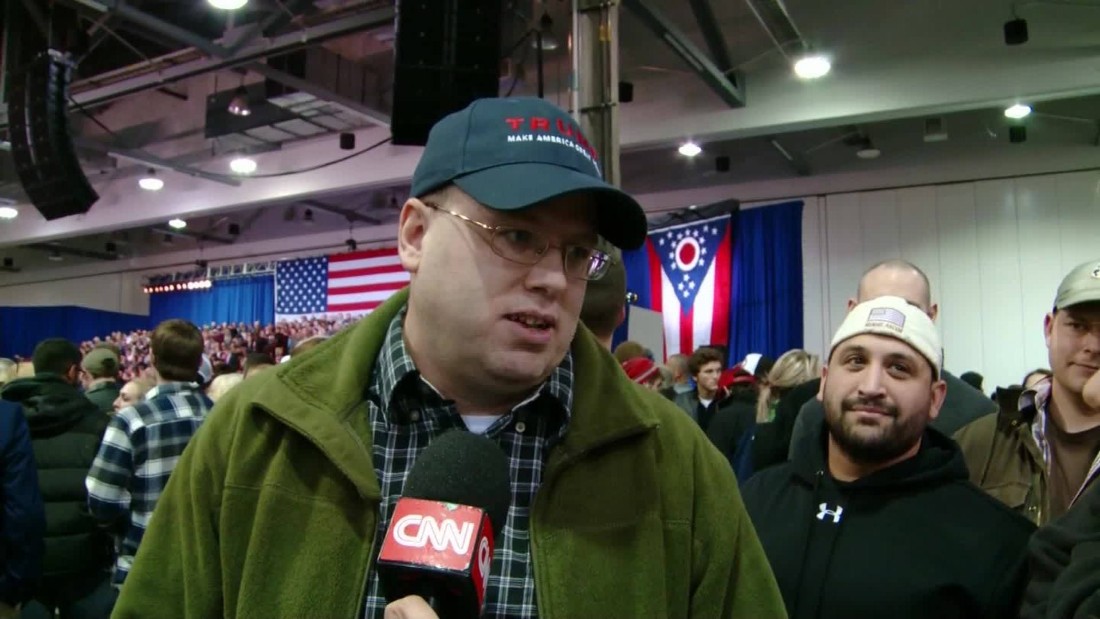
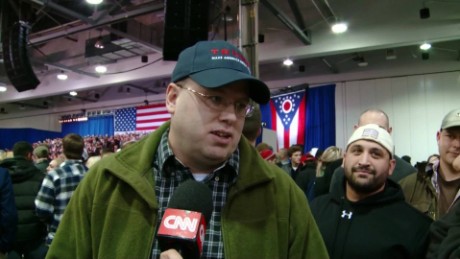
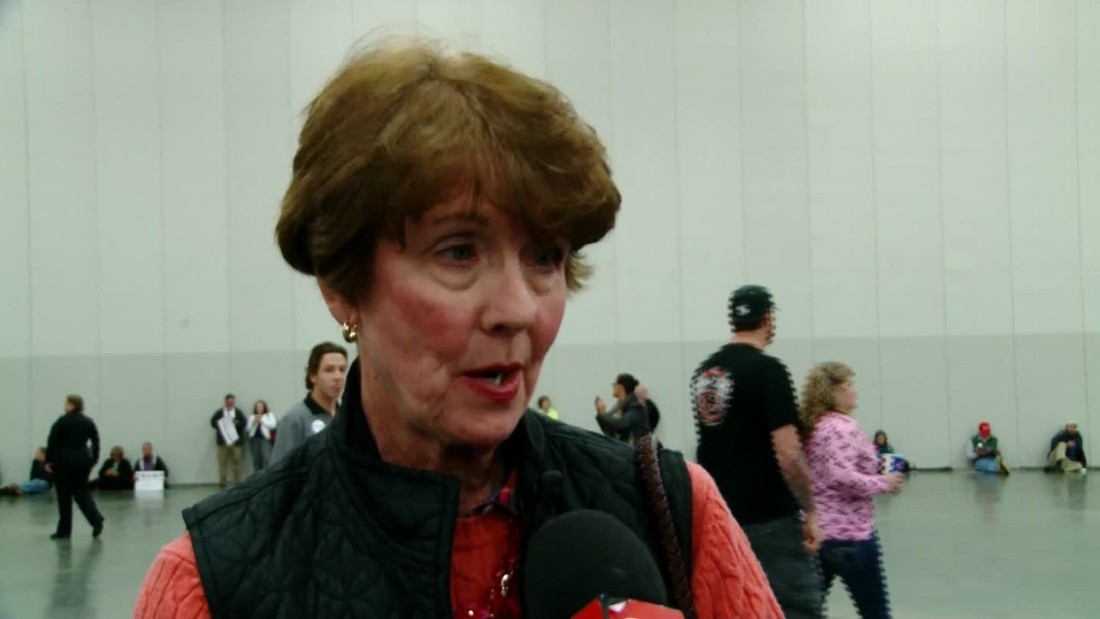
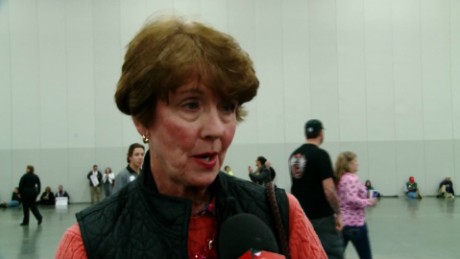
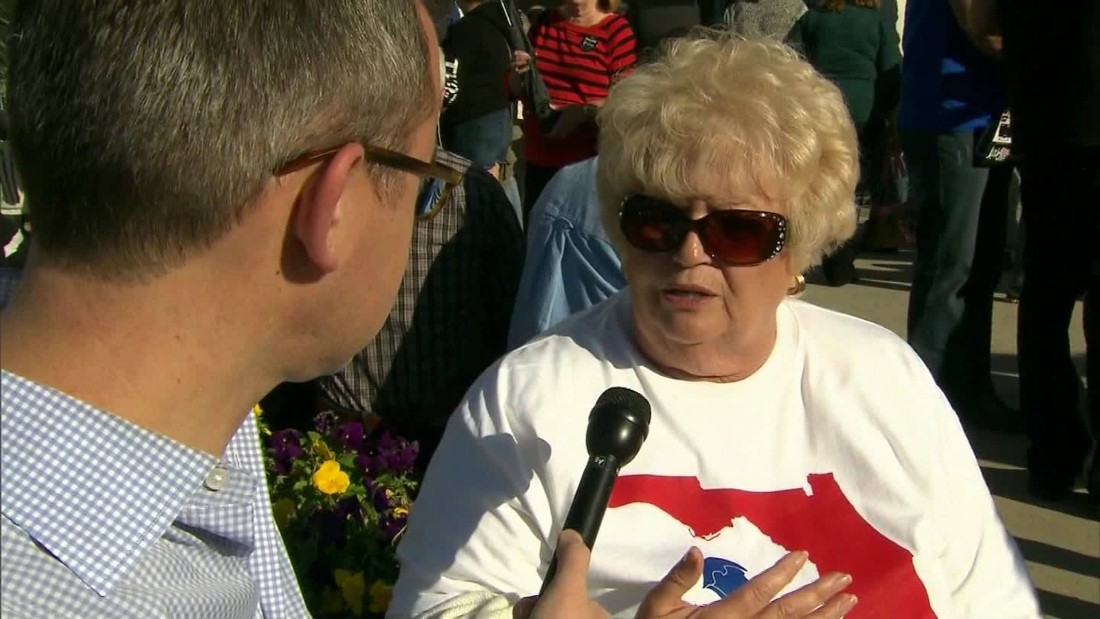
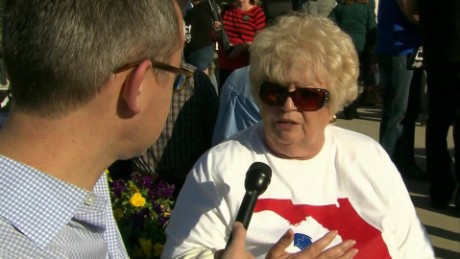
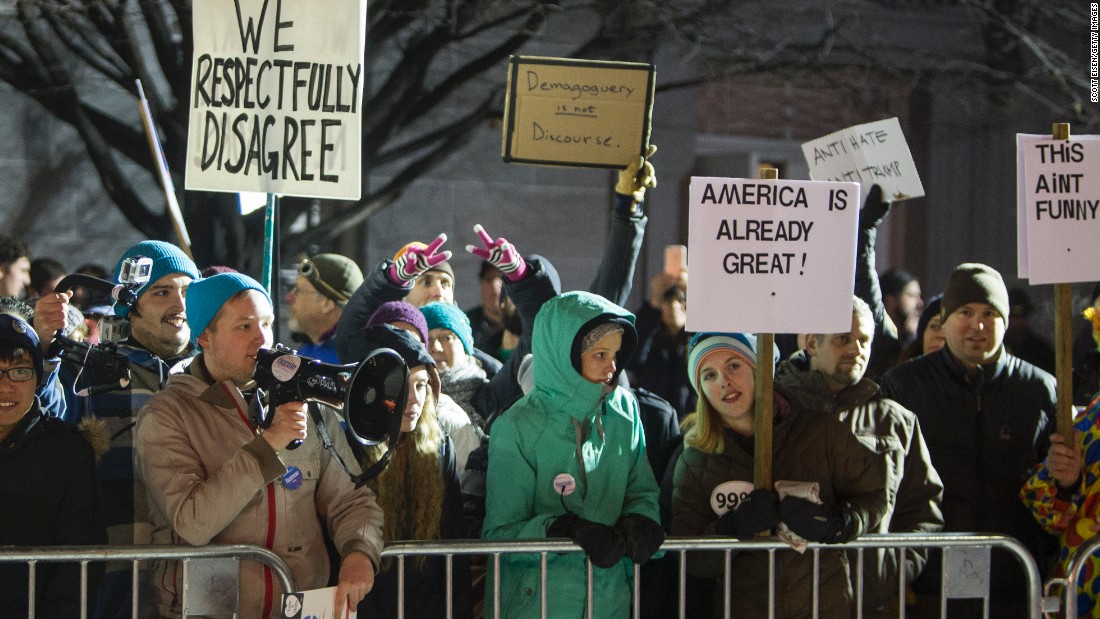
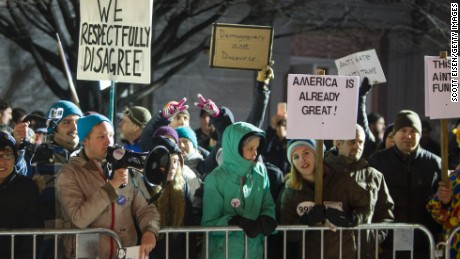
No comments:
Post a Comment
Thanks for commenting. Your comments are needed for helping to improve the discussion.